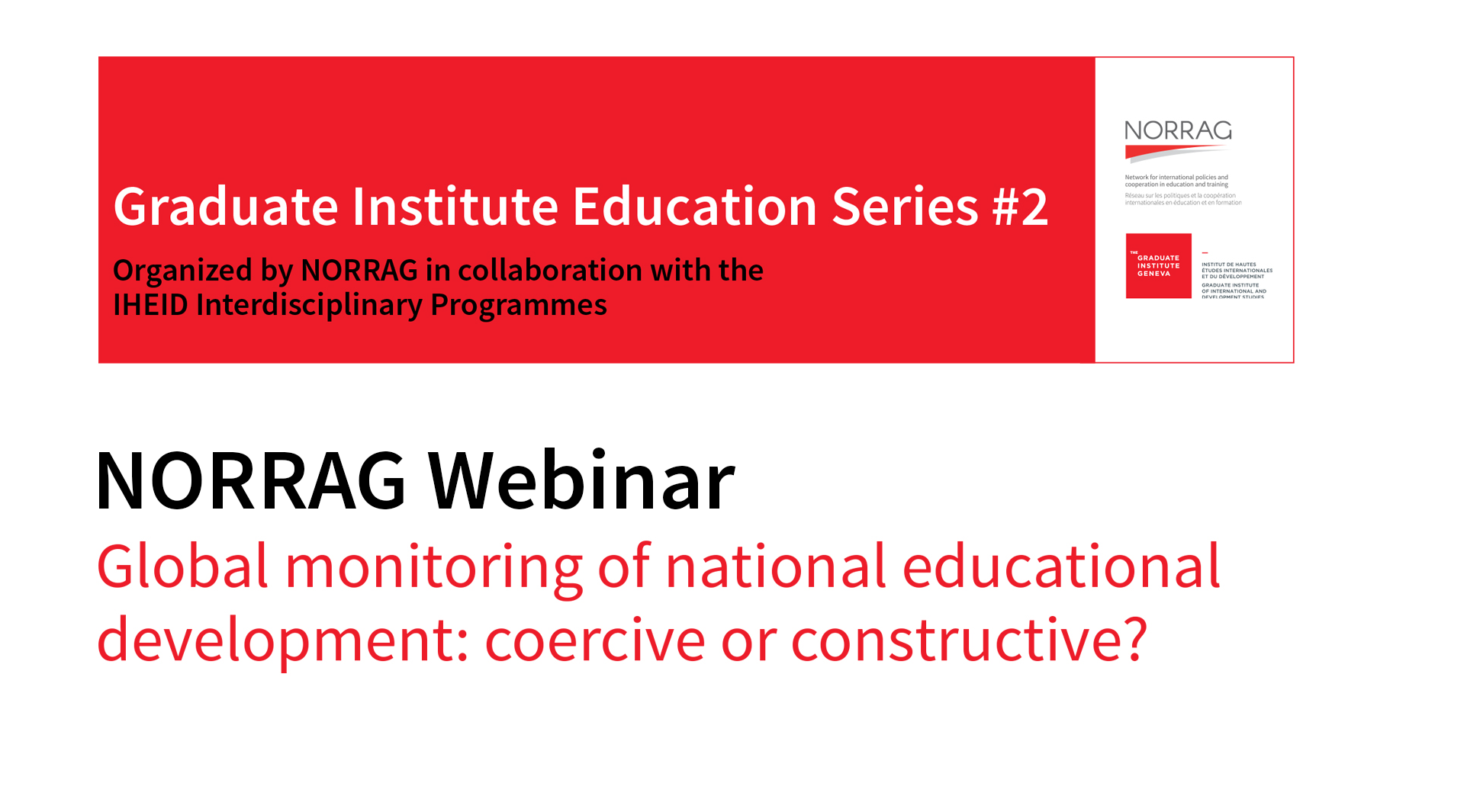[Event report] Global monitoring of national educational development: coercive or constructive?
A panel discussion was held online on 16 March 2020 with internationally renowned experts in education and global governance to discuss the impact of global monitoring on national reform priorities in education. The event launched the new NORRAG Special Issue 03 (NSI 03) on the topic. In NSI 03, the authors examine how global monitoring knowledge is mobilized, produced, disseminated and used. Their analyses are intended to bridge the gap between theory and practice, as well as advocacy and policy in education.
The event was organised as a one-hour webinar, due to the recent outbreak of COVID – 19. Twenty people attended the event.
Paul Coustere, Deputy Director of UNESCO-IIEP, France, kicked off the session by discussing his article in NSI 03, “The Impact of Global Reports on Education”. In this, he argues that the global education reports of the main international organizations enjoy legitimacy and have played an important role in the international mobilization for education for all. However, he pointed out that international organisations must redefine their added value in a globalised world in which they are no longer the only source of information.
Coustere’s presentation was followed by the reflections of Marisol Vazquez Cuevas, an Affiliated Professor in the Interdisciplinary Program on Policy and Educational Practices of the Center for Economic Research and Teaching (PIPE-CIDE) in Mexico, and the guest editor of NSI 03. She discussed why the themes of NSI 03 are particularly pertinent in an ever-modernising world, emphasising that global monitoring reports allow statistics and information about educational policy to be combined and understood internationally. However, she pointed out that these reports are generally written from the perspective of the Global North, and therefore often fail to include recommendations that can be implemented in developing contexts. She argued that NSI 03 is important because it deepens the debate on the topic and gives those from the Global South the opportunity to contribute.
Following this, Gita Steiner-Khamsi, Professor at the Graduate Institute & Columbia University and Director of NORRAG, discussed her article, “Governance at a Distance by Means of Data Circulation.” In this, she asks whether governance by numbers has metamorphosed into governance at a distance by means of data circulation, explaining that this has exacerbates the trend towards results-based aid, more testing, and data mining and circulating. In the article, Steiner-Khamsi also explores how the definition of development and aid eligibility might change in the future.
Finally, Moira Faul, the new Executive Director of NORRAG, raised the question about the role of private sector providers of tests and textbooks in assessments that feed into these monitoring regimes. She discussed an article she wrote in 2014 entitled, “Future-perfect/present-imperfect: Contemporary global constraints on the implementation of a post-2015 education agenda”, in which she argues that the investigation of practices of monitoring allows researchers, policymakers, practitioners, parents and students to see which of the many policy narratives that are evoked will actually be implemented in practice. She also highlighted an article she wrote for Global Partnership for Education, entitled “How can we best diagnose education systems to improve them?”. These articles demonstrate that the policy space is narrowed to follow the monitoring regimes studied. Thus, the function of education systems (as opposed to sectors) are being set to generate these learning outcomes, rather than others.
The session then concluded with a question and answer session from the audience.
You can read NSI 03 in Spanish here.
You can read NSI 03 in English here.
Download the flyer
| Programme |
| Introduction and moderation
Émeline Brylinski, NORRAG Research Associate and Editor of NORRAG Special Issue |
| The impact of global reports on education policy: Are they really aiming to improve education across the world?
Dr. Marisol Vazquez, affiliated Professor at the Interdisciplinary Program on Education Policy and Practices, Centro de Investigación y Docencia Económicas (CIDE), Mexico |
| Beyond Educational Quality: The Battles to Come
Prof. Blanca Heredia, Director, Interdisciplinary Program on Education Policy and Practices, Centro de Investigación y Docencia Económicas (CIDE), Mexico |
| Governance at a Distance by Means of Data Circulation
Prof. Gita Steiner-Khamsi, Graduate Institute & Columbia University, Director of NORRAG |
| The Impact of Global Reports on Education
Paul Coustère, Deputy Director, UNESCO-IIEP, France |
| Discussant:
Moira Faul, Deputy Director, PPP Research Center, Geneva School of Economics and Management, University of Geneva, Switzerland |
| Q&A with the audience |

